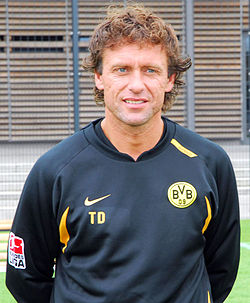Club career
Doll began playing football for the youth teams of local side BSG Lokomotiv Malchin. He was allowed to join the youth academy of football club F.C. Hansa Rostock in 1979. Doll joined the first team of F.C. Hansa Rostock in 1983. He made his debut for F.C. Hansa Rostock in the DDR-Oberliga away against BSG Stahl Riesa in the third matchday of the 1983-84 DDR-Oberliga on 27 August 1983.
F.C. Hansa Rostock was relegated to the second tier DDR-Liga after the 1985-86 DDR-Oberliga. Doll then joined BFC Dynamo in order to ensure a chance to play for the national team. [2] BFC Dynamo was the dominant team in East German football at the time. Doll had the opportunity to choose between BFC Dynamo and SG Dynamo Dresden, but wanted to go to Berlin to be able to stay close to his family and because he already knew players in BFC Dynamo from the national youth teams, such as Andreas Thom. [2]
Doll immediately became a regular player in the first team of BFC Dynamo. He scored his first goal for BFC Dynamo in the DDR-Oberliga in the derby against 1. FC Union Berlin at the Stadion der Weltjugend on 13 September 1986. BFC Dynamo won the match with a massive 8–1. [3] Doll and Thom formed one of the most effective attacking constellations in East German football in the late 1980s. [4] Doll won the DDR-Oberliga in 1987 and 1988 and the FDGB-Pokal in 1988 and 1989 with BFC Dynamo. BFC Dynamo then met SG Dynamo Dresden in the first ever DFV-Supercup on 5 August 1989. BFC Dynamo won the match 4-1 and became the first and only winner of the DFV-Supercup in the history of East German football. Doll scored two goals in the match.
After reunification, Doll was one of the most sought-after players of coming out of the former East Germany. Together with fellow sweeper Frank Rohde in BFC Dynamo he joined Hamburger SV in 1990. After just one season there he had impressed sufficiently to move to Italian side Lazio for a then record fee of DM15 million. He played at Lazio for three years, before returning to the Bundesliga in 1994, joining Eintracht Frankfurt, but he was hampered by injuries in the three seasons he spent with the club and made only 28 appearances. [5] After a year in Italy with Bari, he returned to Hamburger SV in 1998. He played another three seasons, but injuries continued to take their toll.
Coaching career
Hamburger SV
Following his retirement, he became part of Hamburg's coaching staff, managing the reserves from 2002 until being appointed first-team manager in 2004.
Early in his tenure as coach with Hamburg, he enjoyed some success, saving the team from relegation in his first season, winning the Intertoto Cup, and then guiding the club to a much-improved third-place result in the 2005–06 season to earn a Champions League berth. The 2006–07 season, however, was less successful for the coach. The team delivered a disappointing performance in the Champions League that saw only one win in six first-round games, and then plunged to the bottom of the Bundesliga table by mid-season. Doll was sacked on 1 February 2007.
Al-Hilal
On 20 July 2011, he was appointed as head coach of Saudi Arabian champion team, Al-Hilal but was sacked on 22 January 2012.
APOEL FC
On 15 August 2019, Doll became manager of APOEL. [16]
Having managed to guide APOEL to the round of 32 of the 2019–20 UEFA Europa League, on 9 December 2019, Doll got relieved of his duties as the club's manager by mutual consent. [17]
Persija Jakarta
On 23 April 2022, Liga 1 club Persija Jakarta announced Doll as the new manager of the club in a three-year deal. [18] [19] In his first season, he finished in second place.
This page is based on this
Wikipedia article Text is available under the
CC BY-SA 4.0 license; additional terms may apply.
Images, videos and audio are available under their respective licenses.

